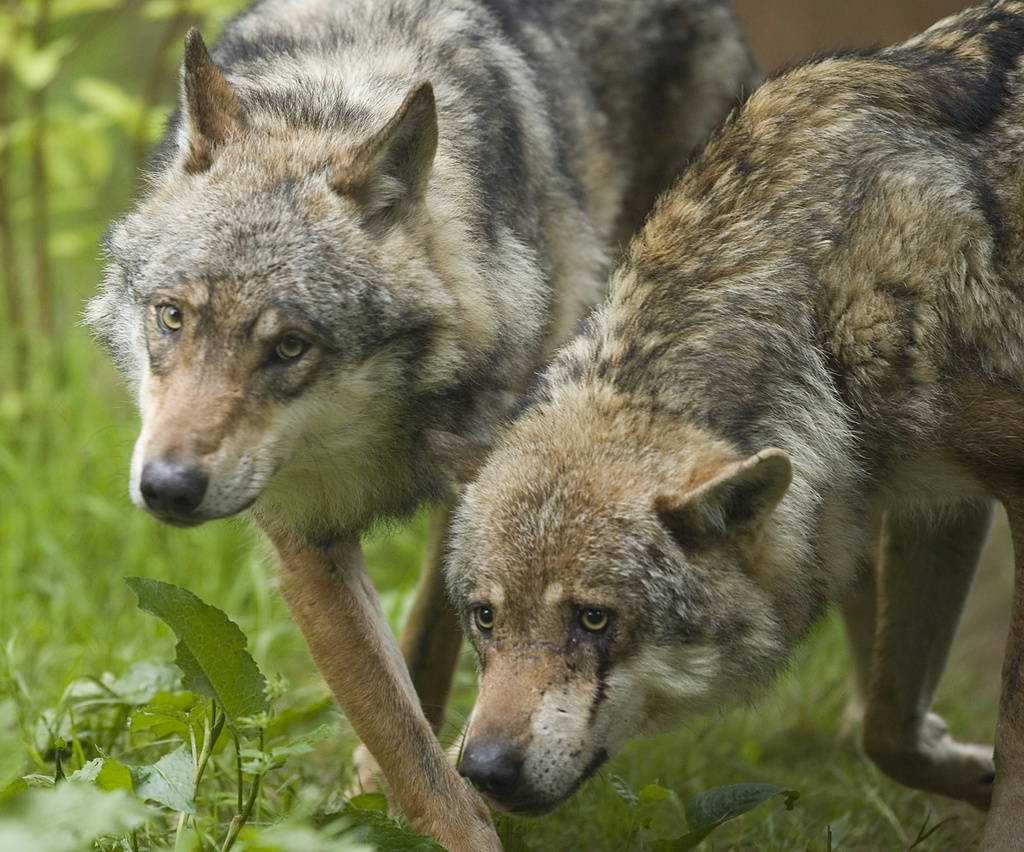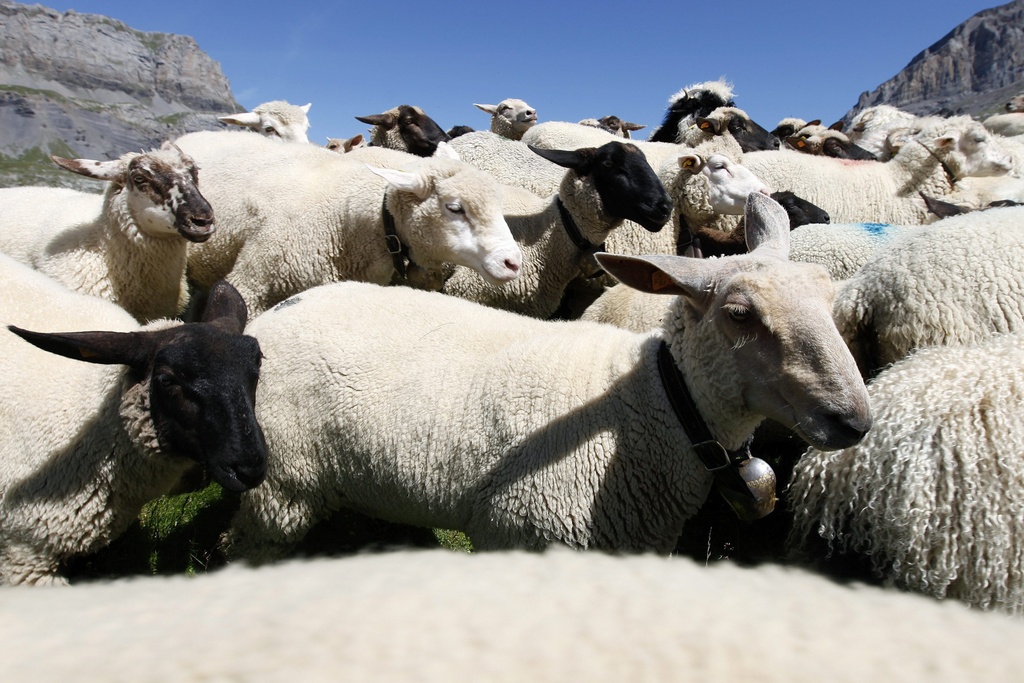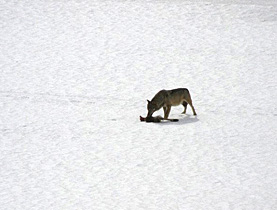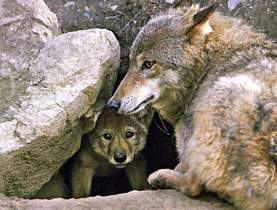Farmers still afraid of the big bad wolf

The wolf is an animal which divides opinion like no other – either hated or glorified, as Environment Minister Moritz Leuenberger has described it.
According to a poll conducted for the nature protection organisation WWF, around three-quarters of the Swiss population are in favour of wolves returning to Switzerland, but the House of Representatives voted on Thursday for a motion that would reduce the wolf’s protected status.
The decision was taken during an impassioned session at which no fewer than 14 motions on the wolf were debated.
Nearly half the proposals were put forward by parliamentarians from the southern canton of Valais, the transit point into Switzerland for wolves spreading northwards from Italy.
It’s a canton where large numbers of sheep spend the summer up in the mountains, where they are particularly vulnerable to attack.
Daniel Kreutzer keeps sheep in the Oberwald area of Valais and has experienced the wolf problem at first hand.
He and seven other farmers send a total of 1,400 animals to spend the summer spread over a large area of mountain pasture, with one man to keep an eye on them.
“We can’t guard the flocks,” he told swissinfo.ch. “We can’t make just one flock, because there are too many of them, and the terrain is a problem: it’s very steep.”
Four years ago, and again last year, the animals were attacked by a wolf. They lost 20 – not enough to get a permit for the wolf to be shot. For that, 35 animals must be killed over a period of four months, or 25 in a single month.
“Glimmer of hope”
The farmers are compensated for each animal that is proved to have fallen victim to a wolf. But compensation is not really the point.
“Money isn’t everything. If I was fixated on money, I wouldn’t breed sheep. I do it because I love them. I know all my sheep,” Kreutzer said.
“You feel pretty helpless. You’re down below and you know there’s a wolf up there. You’re under mental stress as well. We work very hard all year – and then we lose animals like that.”
Kreutzer called the decision by parliament a “glimmer of hope”. He wants to be able to react more quickly when there is a wolf about.
Structural changes
But Kurt Eichenberger, project leader for biodiversity at the WWF, says the decision will make practically no difference.
“There’s no other choice but to be prepared. If the sheep are not protected, the wolf will come and take them. That’s a fact of life. In the Italian and French Alps we have 36 wolf families and a total of about 300 individuals. Wolves will come, whether they are strictly protected or not,” he told swissinfo.ch.
He sees the problem in the way that agriculture is structured in Valais, with lots of small flocks that are kept by “hobby farmers”, which are taken up to the mountains and left to their own devices over the summer.
These flocks are so small that it is practically impossible to protect them, but protection is the only solution, according to Eichenberger.
Small farmers need to get together: it takes the subsidies from 500-600 sheep to pay for the services of a shepherd, he explained.
“In the medium term people who only have a few sheep have no alternative but to adapt to this or continue at their own risk.”
Welcome wolf
Under the current system, the summer pasturing of animals in the mountains is subsidised, whether someone looks after them or not. In Italy, where subsidies are less generous, “it goes without saying that the sheep must always be protected”.
“Today we have a situation which we wrongly call ‘traditional’: until 50 years ago it was never the normal thing to keep sheep or cows in the mountains without protection,” Eichenberger said.
He rejects claims in Valais that the topography makes it different from other regions. The terrain is exactly the same in Graubünden, further east, but in Graubünden there is a long tradition of keeping animals in large flocks there, which makes it a bit easier to protect them.
Protection means shepherds and dogs, or movable fences, which can be shifted as the grass is eaten – although he admits that protection is not easy.
For his part, Kreutzer maintains that this is not feasible in the area where he pastures his sheep, and that herd protection specialists who have visited it agree.
Addressing Thursday’s session of the House of Representatives, Moritz Leuenberger said the government agreed with the motion to amend the hunting ordinance and to improve the protection of flocks.
But he rejected any idea that the wolf should be exterminated.
“I want to say explicitly that we greet the arrival of the wolf – it contributes to the enrichment of our environment,” he told the House.
Wolves were exterminated in Switzerland in the 19th century; the first returned in 1998.
There are currently about 15 wolves in Switzerland, which have entered naturally from Italy.
Switzerland neither encourages them nor stops them.
Young males are the first to arrive, followed by females. The first known cubs in Switzerland were born this year in canton Valais.
In 2010 wolves killed fewer than 100 sheep and goats.
In contrast, some 1500 animals died by falling over cliffs.
To minimise conflict between wolves and stockbreeders the Federal Environment Office has drawn up a Wolf Concept.
The concept is constantly revised, in discussion with the cantons and interest groups to take account of changing circumstances.
It is based on three pillars:
support for farmers to take protective measures
compensation when their animals are attacked
permission to shoot wolves who cause significant damage.
The criteria for shooting a wolf area currently that it must have killed at least 35 farm animals within a specific area over four consecutive months, or at least 25 in one month.
Since 2000 permission has been given to shoot 11 wolves – although at least five of them were not in fact killed.
Shootings are carried out by game rangers; this can work out very expensive since it may take a long time to track the animal down.
The latest case was in August 2010, when a male wolf was shot in the Montana-Varneralp of Valais.

In compliance with the JTI standards
More: SWI swissinfo.ch certified by the Journalism Trust Initiative












You can find an overview of ongoing debates with our journalists here . Please join us!
If you want to start a conversation about a topic raised in this article or want to report factual errors, email us at english@swissinfo.ch.